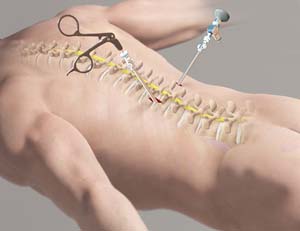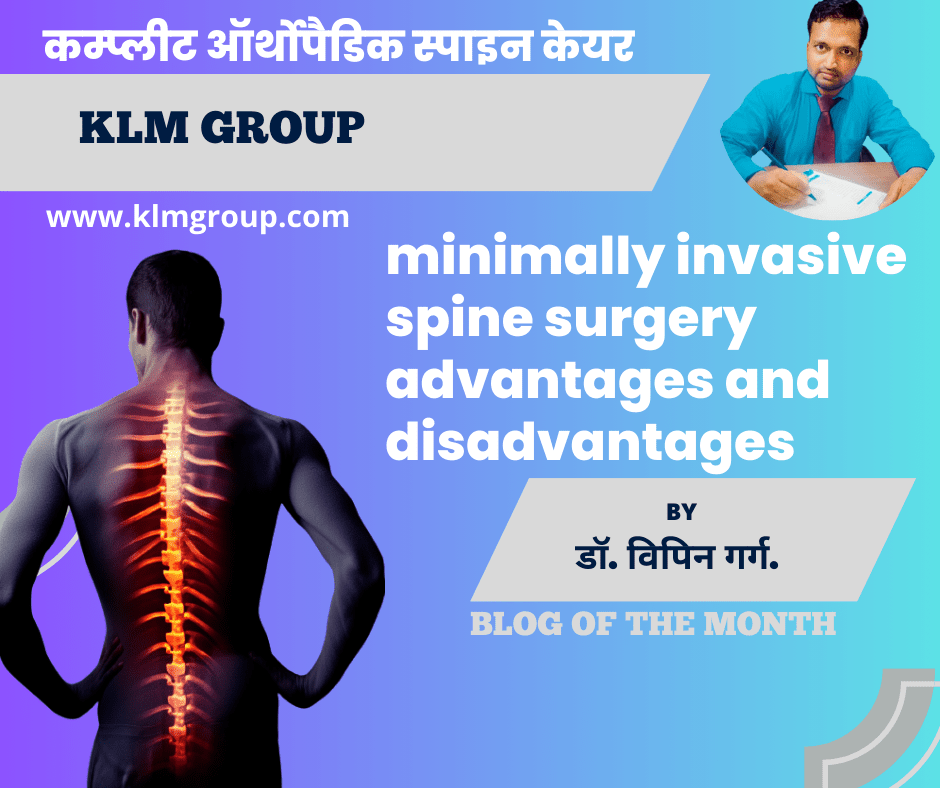minimally invasive spine surgery advantages and disadvantages: In recent years, advancements in medical technology have paved the way for innovative approaches to spine surgery. One such approach gaining popularity is minimally invasive spine surgery (MISS). This surgical technique, characterized by smaller incisions and specialized instruments, offers several advantages over traditional open surgeries. In this blog, we explore the benefits and considerations associated with minimally invasive spine surgery, shedding light on why it’s becoming a preferred choice for many patients seeking relief from spinal issues. We can discuss more regarding “minimally invasive spine surgery advantages and disadvantages”.

- Understanding Minimally Invasive Spine Surgery
- 2. Considerations for Minimally Invasive Spine Surgery:
- FAQs (Frequently Asked Questions)
- Q1: What conditions can be treated with minimally invasive spine surgery?
- Q2: How long does it take to recover from minimally invasive spine surgery?
- Q3: Are there any risks associated with minimally invasive spine surgery?
- Q4: Can all patients benefit from minimally invasive spine surgery?
- Q5: How do I find a qualified surgeon for minimally invasive spine surgery?
- Conclusion
- Book Your Consultation
Understanding Minimally Invasive Spine Surgery
1. Advantages of Minimally Invasive Spine Surgery:
a. Reduced Tissue Damage:
One of the primary benefits of MISS is the minimal disruption to surrounding tissues. Smaller incisions result in less trauma to muscles and ligaments, leading to a quicker recovery and reduced postoperative pain.

b. Faster Recovery Time:
Patients undergoing minimally invasive procedures often experience shorter hospital stays and quicker recovery times compared to traditional open surgeries. This can significantly improve the overall patient experience.
c. Lower Risk of Infection:
Smaller incisions reduce the exposure of the surgical site to external contaminants, lowering the risk of postoperative infections. This is particularly advantageous for maintaining the integrity of the spine and surrounding structures.
d. Less Blood Loss:
Minimally invasive techniques typically result in less blood loss during surgery. This can be especially beneficial for patients with certain health conditions or those who may be prone to complications related to blood loss.
e. Improved Cosmetic Outcome:
Smaller scars and reduced tissue damage contribute to a more favorable cosmetic outcome for patients. This aspect is particularly relevant for those who value the aesthetic result of the surgery.

Read More:
2. Considerations for Minimally Invasive Spine Surgery:
a. Patient Selection:
Not all spinal conditions are suitable for minimally invasive approaches. Patient selection is crucial, and factors such as the specific diagnosis, extent of the spinal issue, and overall health must be carefully considered. We can discuss more regarding “minimally invasive spine surgery advantages and disadvantages”.
b. Surgeon Expertise:
Performing minimally invasive spine surgery requires specialized training and expertise. Patients should seek surgeons with experience in these techniques to ensure a safe and successful procedure.
c. Limited Visibility:
Due to the smaller incisions, surgeons may have limited visibility during minimally invasive procedures. This challenge requires advanced imaging technologies and a high level of surgical skill to navigate the complexities of the spine accurately.
d. Equipment and Technology:
The success of minimally invasive spine surgery is heavily dependent on the availability of advanced equipment and technology. Surgeons use specialized instruments and imaging tools to perform precise procedures through small incisions.We can discuss more regarding “minimally invasive spine surgery advantages and disadvantages”.
FAQs (Frequently Asked Questions)
Q1: What conditions can be treated with minimally invasive spine surgery?
Minimally invasive spine surgery is suitable for various conditions, including herniated discs, spinal stenosis, degenerative disc disease, and certain types of spinal deformities.
Q2: How long does it take to recover from minimally invasive spine surgery?
Recovery times vary depending on the specific procedure and the patient’s overall health. However, many patients experience a quicker recovery compared to traditional open surgeries, with some returning to normal activities within a few weeks. We can discuss more regarding “minimally invasive spine surgery advantages and disadvantages”.
Q3: Are there any risks associated with minimally invasive spine surgery?
While minimally invasive approaches have lower risks compared to open surgeries, potential complications may include infection, nerve damage, or incomplete resolution of symptoms. It’s essential to discuss potential risks with the surgeon before the procedure.
Q4: Can all patients benefit from minimally invasive spine surgery?
Not all patients are candidates for minimally invasive procedures. Factors such as the complexity of the spinal issue, the patient’s overall health, and the surgeon’s assessment play a crucial role in determining suitability.
Q5: How do I find a qualified surgeon for minimally invasive spine surgery?
Researching and consulting with board-certified spine surgeons who specialize in minimally invasive techniques is essential. Patient reviews, referrals, and discussions with healthcare professionals can help guide the selection process.
Conclusion
Minimally invasive spine surgery represents a significant advancement in the field of spinal care, offering numerous benefits for eligible patients. As with any medical procedure, thorough consultation with a qualified healthcare professional is essential to determine the most appropriate treatment approach. The advantages of reduced tissue damage, faster recovery times, and lower risk of complications make minimally invasive spine surgery an attractive option for many individuals seeking relief from spinal conditions. Always prioritize thorough discussions with your healthcare provider to make informed decisions about your spinal health.
Book Your Consultation
Website: https://tinyurl.com/yyzvwmck
Email: info@klmgrou p.org
Ph: 0751-4000721,Mob: 7804826825
Address: 12, Saraswati Nagar, University Road, Near Silver Estate, Thatipur,
Address Link: https://g.page/r/CQ0WqKLEXPWeEAE Powered By Argusdna

